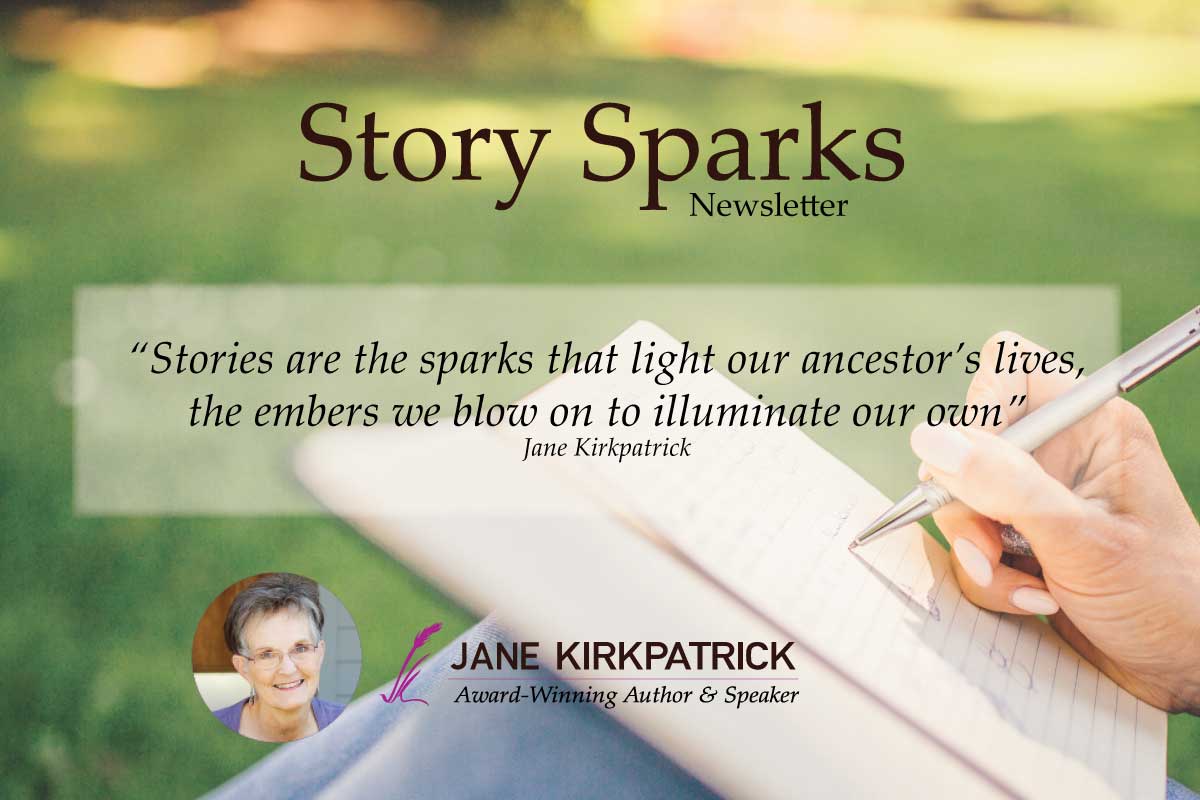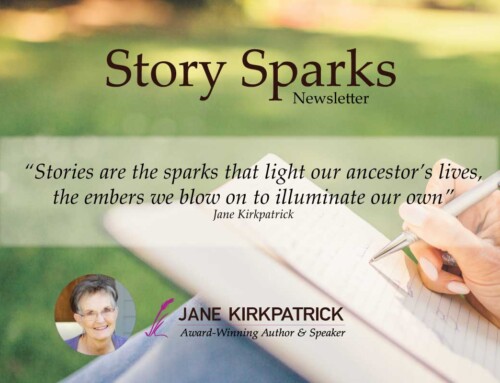October 2023 Story Sparks
Good Work, Good Hearts
I won’t get the details correct. I was driving, listening to the radio, and couldn’t find a good place to pull over to write things down. But as soon as I got home I told Jerry. I’d read somewhere that it helps to remember things by sharing it with others. So here it is.
It was a story about work, how it affects us, how we judge people (or evaluate them) based on how they work, what energy is put into the task we’ve chosen or have been given. The French have a word – Metier – meaning “work to which one is best suited and work that the world needs doing.” Frederick Buechner, a theologian who also writes fiction and non-fiction wrote that “The kind of work God usually calls you to is the kind of work (a) that you need most to do and (b) that the world most needs to have done.” How people relate to their work is one of the threads I weave in my stories.
 But what I was most intrigued about is that some researchers who had access to a “primitive” people wanted to see how they evaluated work. They asked what made up a “good heart”, the term that best described a highly valued person.
But what I was most intrigued about is that some researchers who had access to a “primitive” people wanted to see how they evaluated work. They asked what made up a “good heart”, the term that best described a highly valued person.
The two qualities these “primitive” people named as most meaningful for someone with a good heart was first, generosity. I love that! The world-famous psychiatrist and founder of the Menninger Clinic in Kansas said that generosity is the single most important indicator of a person’s mental health. “Generous people are rarely mentally ill.”
The second quality was what the researchers called a “good work ethic” made someone have a good heart. Someone who carried their weight for the community, who did the tasks expected of them and was cheerful about it, that’s what gave one a good heart. I love the cheerfulness quality especially associated with work.
It struck me that there wasn’t a concern about outcome, the actual production of a product. That didn’t make a good heart. Success didn’t make a good heart. It was the attitude one carried toward the task. A generosity of spirit perhaps.
Fiction writers need a good antagonist. And now I have a new quality to consider for creating a character a reader won’t like: their attitude toward work and perhaps their miserliness (if that’s a word).
But I also find some comfort in the philosophy of these primitive people. Much of my work these days is tending Jerry and doing the daily stuff that I find less than fulfilling. Laundry. Shopping. Cooking. Refilling prescriptions. Making calls. But I can see now that if I bring a generous attitude toward this work, it will lift my spirits (and likely Jerry’s too.) And if I stop judging my worth by the output and rather by my attitude, I might just find I too, have a good heart. Maybe you’ll find that about yourself, too,
The Power of Story in Our Lives
That was the subject of a 2 hour lecture I was asked to give at Willamette University’s Institute for Continued Learning. Because of a change in circumstances, it became a zoom event. It saved me six hours of driving, arranging for someone to check in on Jerry and pack up what Rupert might need. Instead I did the presentation from my office. I learned how to use a PowerPoint on screen (thanks to the technical support of the University) and it was recorded. So if you are interested in both the power of story in our lives and some of the threads I use to tell stories, click on this link to view my talk.
Aurora
The famous Aurora Quilt Show is October 13th – 22nd. You can take a walking tour to follow the life of Emma Giesy, one of the prominent women of the Aurora Colony. When I did my research for the Change and Cherish series about that colony and Emma’s life within it, I discovered that she was the only woman who had her own sheet in the ledger book. I could see what thread she bought, what material. And some years, Emma’s quilts are displayed during the show. She was a spectacular quilter and she had a good heart, too. Visit auroracolony.org for more information.
Women Writing the West Conference — a Virtual event October 12-14
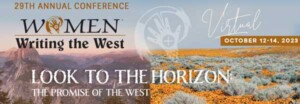 For those of you interested in writing, you can hear some great writers talk about their craft, (e.g.Page Laambert, Johnny Boggs) attend workshops on writing, (e.g. Editing Bootcamp or Julie Weston’s From Memoir to Mystery – Grounding Prose in Reality), and hear short readings from award winning books, all in the comfort of your homes. There is still time to sign up. I’ll be in some of those virtual rooms and I’ll be reading close to 5:30 pm on Saturday (see the schedule) from Beneath the Bending Skies that is a finalist for the 2023 WILLA Literary Award for Historical Fiction. It’s a feast for writers. Check it out at www.womenwritingthewest.org.
For those of you interested in writing, you can hear some great writers talk about their craft, (e.g.Page Laambert, Johnny Boggs) attend workshops on writing, (e.g. Editing Bootcamp or Julie Weston’s From Memoir to Mystery – Grounding Prose in Reality), and hear short readings from award winning books, all in the comfort of your homes. There is still time to sign up. I’ll be in some of those virtual rooms and I’ll be reading close to 5:30 pm on Saturday (see the schedule) from Beneath the Bending Skies that is a finalist for the 2023 WILLA Literary Award for Historical Fiction. It’s a feast for writers. Check it out at www.womenwritingthewest.org.
Word Whisperings
Where Coyotes Howl by Sandra Dallas
St. Martins Press, 2023
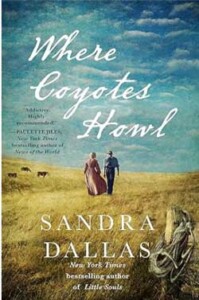 Anything by Sandra Dallas is a gem to read but this latest book is exceptional. Joyce Carol Oates wrote that what makes a great story is first that we have to feel empathy for the character. We need to have someone to cheer for. And in this book, Ellen is that character: a school teacher who makes her way to Wyoming, falls in love with a cowboy, a love true and pure as a mountain stream. But there are numerous women to cheer for. Gladys, a reformed woman of negotiable affections and a woman who lost her son and Ruth McGinty where Ellen first boarded who had a wretched husband (speaking of antagonists one can love to hate). Each is memorable with the kind of detail Sandra Dallas is known for. Oates said a second quality of a good book is to tell a story through voices that are seldom heard. I think that’s why I have loved the organization of which both Sandra and I are founding members, Women Writing the West. That organization understands the importance of telling the stories of pioneer women, of native women, of girls growing up on prairies or in the shadow of the Sierra, of contemporary women and our influence on the West. Their hardships, courage and the formation of communities of heart is the lifeblood of my own writing history. And it’s Sandra’s too and she does it so well. And finally, Oates said that a good story should memorialize. It should be a story we want to remember. Where Coyotes Howl is that kind of story. As Francine Rivers (another fabulous writer) said of this book “So many characters fully rendered, lives that grip the heart. I could feel the Wyoming wind in my face and smell the dust.” This story is a western treasure; a western woman’s eulogy. Bring the tissue or better a handkerchief with a crocheted edge.
Anything by Sandra Dallas is a gem to read but this latest book is exceptional. Joyce Carol Oates wrote that what makes a great story is first that we have to feel empathy for the character. We need to have someone to cheer for. And in this book, Ellen is that character: a school teacher who makes her way to Wyoming, falls in love with a cowboy, a love true and pure as a mountain stream. But there are numerous women to cheer for. Gladys, a reformed woman of negotiable affections and a woman who lost her son and Ruth McGinty where Ellen first boarded who had a wretched husband (speaking of antagonists one can love to hate). Each is memorable with the kind of detail Sandra Dallas is known for. Oates said a second quality of a good book is to tell a story through voices that are seldom heard. I think that’s why I have loved the organization of which both Sandra and I are founding members, Women Writing the West. That organization understands the importance of telling the stories of pioneer women, of native women, of girls growing up on prairies or in the shadow of the Sierra, of contemporary women and our influence on the West. Their hardships, courage and the formation of communities of heart is the lifeblood of my own writing history. And it’s Sandra’s too and she does it so well. And finally, Oates said that a good story should memorialize. It should be a story we want to remember. Where Coyotes Howl is that kind of story. As Francine Rivers (another fabulous writer) said of this book “So many characters fully rendered, lives that grip the heart. I could feel the Wyoming wind in my face and smell the dust.” This story is a western treasure; a western woman’s eulogy. Bring the tissue or better a handkerchief with a crocheted edge.
Books I Haven’t Read Yet But Have on My Shelf
Since I don’t have a book coming out until 2025, I thought I’d let Story Sparks celebrate and promote other authors I highly recommend.
Seven Summers (and A Few Bummers) My adventures hiking the 2,650-mile PCT by Bob Welch. You don’t have to want to hike the famous Pacific Crest Trail in order to enjoy this book. ANYTHING Bob writes whether about the first nurse to die in WWII (American Nightingale )or a series of essays about remarkable people (More to Life than Having it All), or a dozen others, Bob’s wit and humor and humility put his good heart on full display. (He was also my first writing instructor way back in 1982). For those in the Northwest, Bob will be at Paulina Springs Book Store in Sisters, OR on October 5th at 6:30. I’ll be there!
The River we Remember by William Kent Krueger. A friend sent me this book knowing I love his work. One of my favorite of his is Ordinary Grace. But this one is a classic, too. It’s about broken people living in southern Minnesota, about a Dakota man accused of murder and his Japanese wife well, accused of being an outsider. There seems to always be a lawman of some kind in Krueger’s stories and this one is no exception. Brody Dern is a small town sheriff, a man one can cheer for and maybe hold in a little disdain for some of his choices. I told my gift-giving friend that the book is a worry because the characters are in such peril — from the woman who cooks at the eatery and her son who has a literal hole in his heart and the widowed deputy and the accused Indian AND the family of the deceased. They’re all struggling. Things were tough in 1958 too. But one is never disappointed in a Krueger book. Bring that crocheted handkerchief to this story too.
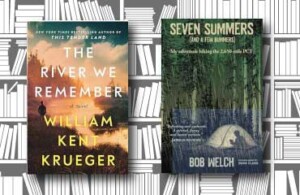
What We Leave Behind
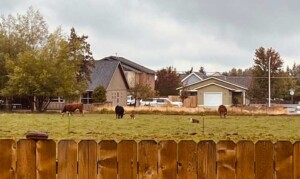 We’re getting ready to head south to California for the winter. I’ll miss our view of the six cows in the pasture behind our house. I thought they were all steers but the summer has brought great delight in waking to new baby calves. There are four out there now. I’ll forgive this dairy girl for not recognizing heifers over steers. I didn’t have binoculars. We left those in California. It’s a long drive — nearly a thousand miles to our “coach” park. Southern California use coach instead of trailer.
We’re getting ready to head south to California for the winter. I’ll miss our view of the six cows in the pasture behind our house. I thought they were all steers but the summer has brought great delight in waking to new baby calves. There are four out there now. I’ll forgive this dairy girl for not recognizing heifers over steers. I didn’t have binoculars. We left those in California. It’s a long drive — nearly a thousand miles to our “coach” park. Southern California use coach instead of trailer.
Last year we were able to make the car audio work so we could listen to a Louise Penny book while I drove. At a library sale, I bought a few audio tapes we hope to pop into the player. But we also have hours of music and quiet with scenery that begs stopping often to inhale on the East side of the Sierra. Rupert’s a good traveler having made the trip down and back already in his barely one year old life. And Jerry is as comfortable as he gets in the car. (Thank you to whoever engineered Toyota’s SUV seats). I’ll take with me the drafts of my screenplay efforts and the progress on my three book series. A young woman working on her commercial pilot’s license will stay in our home and be here to let us know if a pipe breaks or the furnace stops working. She has a retriever. Rupert leaves her the yard to run in. We say goodbye for a few months to be where Jerry will be warm. I’ll send you missives from our Bing Crosby created coach park.
Meanwhile, Jimmy Buffett passed away last month. He had a good heart. Here’s my favorite video and song.
Take care of your good hearts, my friends.
See you in November.
P.S. I often get requests from those wishing a book list of my titles. Incidentally, Wikipedia has some errors. Visit my Bibliography webpage for the real scoop.
